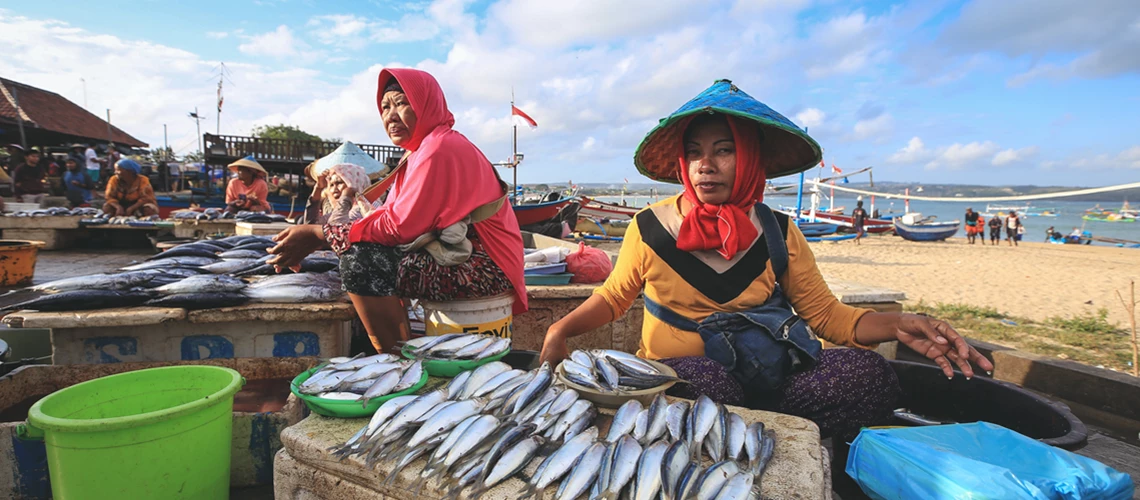 Kedonganan Fish Market, Bali, Indonesia. Photo: freepik.com
Kedonganan Fish Market, Bali, Indonesia. Photo: freepik.com
Oceans have absorbed more than 90 percent of the global warming that has occurred over the past 50 years. For that, humanity has much to be thankful. This heat absorption has protected us from even larger shifts in the earth’s temperature.
However, the oceans are not immune to the effects of this accumulating heat. Rising water temperatures are impacting fisheries, intensifying storms, raising sea levels, and causing shifts in coastal ecosystems. With over 300 million people worldwide dependent on fisheries for their livelihoods and more than 3 billion people relying on seafood for their protein intake, the impact of climate change on oceans is significant.
World Bank analysis, undertaken in partnership with the University of British Columbia and government counterparts in several countries, is quantifying these impacts. It predicts that the fishery catch potential of many African countries, including the Democratic Republic of Congo, Côte d’Ivoire, Equatorial Guinea, Gabon, Liberia, and São Tomé and Príncipe, could decrease by 30 percent or more by 2050. Similarly in Indonesia, the catch potential of important commercial species, including Bali sardinella, torpedo scad, mackerel, and skipjack tuna, could decline by 20-30 percent in the same timeframe (Figure 1).

A recently published report, “Hot Water Rising: The Impact of Climate Change on Indonesia’s Fisheries and Coastal Communities”, jointly prepared by the World Bank, the Indonesian Ministry of Marine Affairs and Fisheries, and the University of British Columbia, and supported by PROBLUE and the Packard Foundation, unpacks these challenges and provides options for adaptation.
Total economic returns in the fishery sector are projected to decrease by between 15 and 26 percent under low emission and high emission scenarios across the Indonesian exclusive economic zone by 2050, in the absence of adaptation measures. These impacts would be critical to Indonesia, where fisheries contribute more than $27 billion annually to the economy, supplying half of the country’s protein intake and supporting over 7 million jobs.
Total economic returns in the fishery sector are projected to decrease by between 15 and 26 percent under low emission and high emission scenarios across the Indonesian exclusive economic zone by 2050, in the absence of adaptation measures.
However, the report also shows that strong fisheries management can help offset climate change-related losses. For instance, preventing overfishing (by maintaining total fishing effort at 80 percent of the maximum sustainable yield), would mitigate losses in the large-scale fishing sector, with economic returns projected to be 4-6 percent greater than those received today. In the small-scale sector, preventing overfishing would reduce economic losses from a predicted 17-19 percent to 9-10 percent (Figure 2). The difference between these sectors is a function of the fish species caught by each sector.

The report identifies three strategic interventions that can further lessen the impacts of climate change on fisheries and coastal communities:
- Strengthened fisheries management. Strong fisheries management is the first line of defence against climate change, keeping fish populations at healthy levels to ensure a buffer against climate impacts. Indonesia aims to operationalize a decentralized fishery management system that can provide localized and responsive management. This includes quota-based fishing, which allows greater flexibility on when and how much is harvested, within a set limit. Other measures such as expanded use of vessel monitoring systems could help improve safety-at-sea and provide data to aid fisheries management decisions. Rapid and targeted fishery closures (“dynamic management”) could be used to reduce the pressure on fisheries during marine heatwaves.
- Protected coastal ecosystems. Healthy ecosystems are the foundation of a climate-resilient ocean economy. An expansion of Marine Protected Areas, with a focus on high-biodiversity locations, fish nursery grounds, and upgrades to management capacity, is required globally. Protection of coastal mangroves is also critical, given their role in protecting erosion-prone coastlines and supporting fisheries. Integrating mangroves into the national REDD+ framework to facilitate carbon financing would help. Introducing standardized sampling protocols for coral reefs, mangroves, and seagrasses would enhance systematic monitoring – a key part of management. Indonesia provides a good example of a country investing in ocean ecosystems through the World Bank-financed Oceans for Prosperity (Lautan Sejahtera, LAUTRA) Project, and the Mangroves for Coastal Resilience Project.
- Empowered coastal communities. Ensuring communities have diverse economic opportunities is critical to long-term adaptation, providing security and incentives for people to transition to new sectors. This means a holistic approach to providing finance, business skills, and access to markets to support business growth and reduce reliance on fisheries. Coupled with social protection systems and climate-insurance (which could be tailored to cover fishers’ losses from storms or marine heatwaves), these can provide an additional layer of support.
Ultimately, climate resilience cannot be considered separately from the development needs of coastal communities. The improvement of fishers’ income and safety, stock productivity, and economic diversification are intertwined with climate and development goals. Measures such as these can enable coastal communities to survive a changing climate in Indonesia and around the world.




Join the Conversation